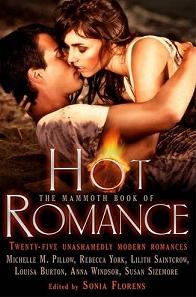
[Edited to correct release date]
The American edition of The Mammoth Book of Hot Romance is available for pre-order! Official release date is now August 23, 2011.
My story in the anthology is called “Crimean Fairy Tale.”
Here’s a snippet:
Private Jonas Weston survived Balaclava without a scratch, then things got worse. He emerged from the brutal battle at Inkerman Heights with a shallow lance wound over a broken rib, bad dreams, and hands that would never quite stop shaking. Three nights after the battle, when he’d once again woken screaming, Sergeant Jennings told him, “I’ve a certain cure for the shakes, lad.”
Weston took another swig of coarse arrack and coughed into the embers of their shared campfire. It tasted miles worse than rum, but was thankfully stronger, and it helped numb the sharp pain in his side. If only he could get enough to make him sleep. He feared there wasn’t enough in the world. “Need more of this,” he said, shaking the flask.
“Not a bit of it. You need to dock a bobtail.”
#
Curious? Did I mention I had fun doing research? I had some lists of naughty Victorian slang, and I used as much of it as I could. Possibly too much, though I hope the meanings are reasonably clear from context.
These two books were my main sources for details of the Crimean War itself and what it was like for the soldiers: The Thin Red Line: An Eyewitness History of the Crimean War by Julian Spilsbury and Death Or Glory: The Legacy Of The Crimean War by Robert Edgerton, which has some interesting comparisons to the American Civil War.
It’s an especially interesting war because of the influence of journalism. Reporters like William Howard Russell for the Times sent despatches via telegraph, and even soldiers’ personal letters were sometimes printed in the English newspapers. Artists like William Simpson provided lithographs of the conflict, precursors of the photographers of the American Civil War. These accounts of the front are credited with being partially responsible for Florence Nightingale’s journey to the Crimea and her subsequent improvement of hospital conditions for the wounded soldiers. The Crimean War: As Seen by Those Who Reported It collects a number of period reportage and looks to be an excellent resource on this topic.
I am really, really interested in giving this volume a look, too: The Crimean War in the British Imagination.
